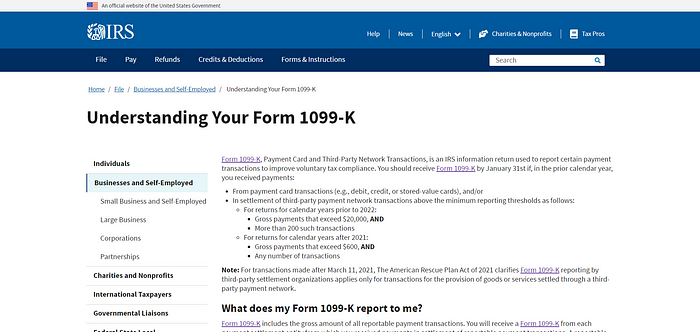Gig Workers, No One is Telling You These Things But You NEED to Know…

If you drive for Uber, Lyft, DoorDash, or if you work and earn money or plan to do so in the gig economy, there’s a lot of very important information that you need to hear that most aren’t going to tell you, but its extremely important you know these things!
First, you’re going to be classified as a self employed individual — you might already know that — but the important thing here is that you are going to be required to file self employment income taxes regardless of if your platform sends you a 1099K form or not. You are required to file self employment income taxes if you earn a net income over $400. Anything below $400 is technically a hobby in the eyes of the IRS, but if it reaches $400 and goes beyond you are required to claim it on your income taxes.
Many low income individuals may think that they do not have to file income taxes because they fall below the IRS minimum threshold for requiring a tax return. That does not apply to self employed income. With self employment income, the IRS States that you must file a tax return if you earn a net income over $400 in a year.

The next thing that you need to know is that this applies regardless of whether or not your platform sends you a 1099k. For companies such as Uber and Lyft, they are going to be sending you out a 1099K, but they don’t send out a 1099K to everyone. In 2022 in order to receive this tax form, your gross payments must have exceeded $600 from the company.
The next thing I want you to know goes against what many of the popular YouTube channels will tell you. Many popular channels will tell you to write off all of the possible deductions that you can on your tax return to lessen your tax bill. Well, unfortunately, this is going to have some negative consequences as a result. Its important to weigh the benefits and detriments of deducting away the majority of your income and decide what makes the most sense for your future goals.
If you choose to write off a large portion of your income of your income through tax deductions, you’re going to have a very low net income and in some cases $0 net income or even a net operating loss. This can have an adverse effect on you if you are trying to apply for different financial goals such as loans, financing, apartments, and mortgages.
Writing off all these tax deductions not only has an immediate consequence on lowering your net income, but it also can affect you for three years. If you are someone who is going to apply for purchasing a home later on down the line, mortgage companies and financing applications are going to look at three year averages of your self employment income. This is something that you definitely want to keep in mind when it comes to tax write offs if you’re someone that has plans or hopes to buy a home later on down the line.

After taxes, the next thing to take into consideration is how your finances are set up. As a self employed individual, you are going to have to have a careful way to account for all of your business deductions, expenses and income. Now, I recommend opening up two completely separate accounts from your regular personal accounts. These can also be personal checking and savings accounts, they don’t have to be business accounts — because most likely as a gig worker, you do not hold a business license.
Open up two additional personal accounts; one is going to be checking and one is going to be savings. The savings account is going to be for setting aside your estimated amount that you’re going to owe for income taxes and self employment taxes at the end of the year. Additionally, set up a checking account where you will receive your payments from your gig work as well as pay for any business related expenses. Only use those two accounts for your work and don’t combine them with personal bank accounts. This way, at the end of the year, your finances are completely separate. All of your income and deductions are all very easily accessible through these bank accounts.

Next, let’s talk about taxes. As a self employed individual, you’re going to be subject to paying self employment tax come tax time in April. Self employment tax is 15.3%, which equals Social Security and Medicare tax. In addition to that 15.3%, you are also going to be required to pay regular federal taxes and state taxes. As a generalization, it’s usually a good idea to estimate at least 30% of all of your income to be set aside for taxes. Many people wonder if they should estimate this based on their net income or their gross income. Gross income is the total amount of income that you receive and net income is how much you actually keep, once you account for your deductions. You are going to be taxed on your net income — however, as a safety net — I strongly recommend setting aside 30% from your gross earnings because this allows you to ensure that you are well prepared for income taxes.
When income taxes are due, if you owed self employed taxes and anticipate to owe $1,000 or more in taxes in the following year, you are not only going to be required to pay that year’s owed balance in taxes, but you are also going to then be required to pay first quarter estimated taxes along with that tax filing. This is an additional expense that many people don’t realize is coming and can be hard to plan for.
If you earn over $1,000 in that tax year, the IRS then wants you to pay out an estimated amount of what it thinks you will owe next year. This is done on a quarterly basis, so that means that the IRS takes what they think you will owe, breaks it down into four separate quarters and have you pay off one of those payments every quarter. The first of these payments is due right along when you file your income taxes. This can be a big blow if you are not expecting that additional amount due in taxes.
Finally, what happens if you have a larger than anticipated tax bill and you do not have the money to pay it? The IRS does allow you to request a payment plan wherein you can ask the IRS to take what you owe and break it out into a series of payments throughout a certain time span. Not only does it give you additional time, but if you request a payment plan as opposed to simply not paying your balance and waiting to pay it off, the IRS reduces the amount of penalties that it assesses to that late tax payment.
Want to learn more about self employment taxes as a gig worker? Watch the video here!




